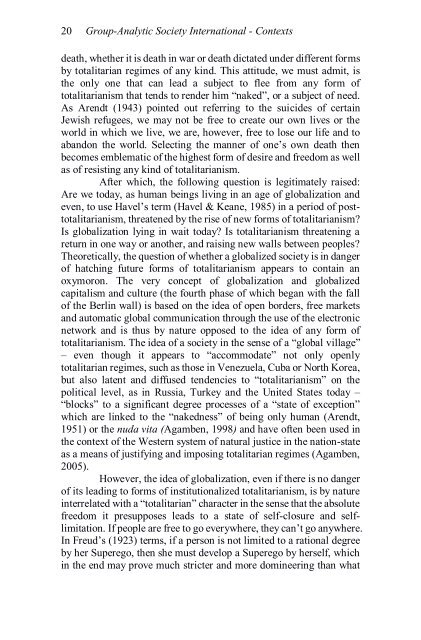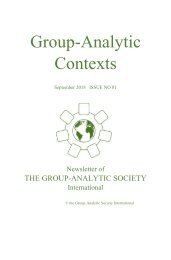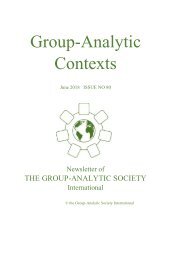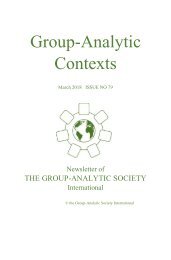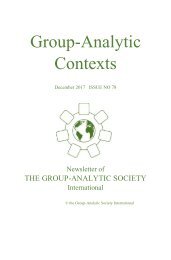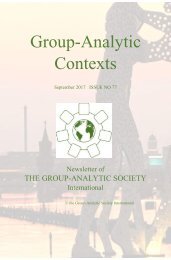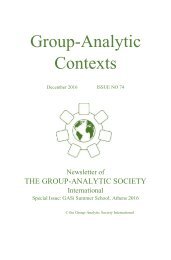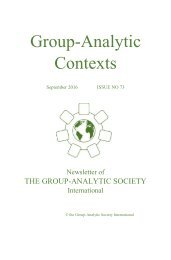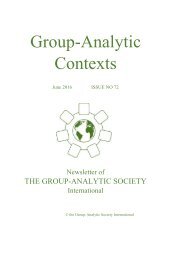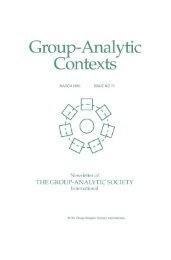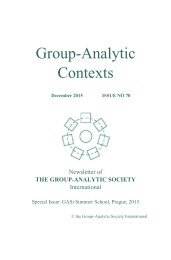Group-Analytic Contexts, Issue 76, June 2017
Special Issue: Preparing for the Berlin Symposium
Special Issue: Preparing for the Berlin Symposium
Create successful ePaper yourself
Turn your PDF publications into a flip-book with our unique Google optimized e-Paper software.
20 <strong>Group</strong>-<strong>Analytic</strong> Society International - <strong>Contexts</strong><br />
death, whether it is death in war or death dictated under different forms<br />
by totalitarian regimes of any kind. This attitude, we must admit, is<br />
the only one that can lead a subject to flee from any form of<br />
totalitarianism that tends to render him “naked”, or a subject of need.<br />
As Arendt (1943) pointed out referring to the suicides of certain<br />
Jewish refugees, we may not be free to create our own lives or the<br />
world in which we live, we are, however, free to lose our life and to<br />
abandon the world. Selecting the manner of one’s own death then<br />
becomes emblematic of the highest form of desire and freedom as well<br />
as of resisting any kind of totalitarianism.<br />
After which, the following question is legitimately raised:<br />
Are we today, as human beings living in an age of globalization and<br />
even, to use Havel’s term (Havel & Keane, 1985) in a period of posttotalitarianism,<br />
threatened by the rise of new forms of totalitarianism?<br />
Is globalization lying in wait today? Is totalitarianism threatening a<br />
return in one way or another, and raising new walls between peoples?<br />
Theoretically, the question of whether a globalized society is in danger<br />
of hatching future forms of totalitarianism appears to contain an<br />
oxymoron. The very concept of globalization and globalized<br />
capitalism and culture (the fourth phase of which began with the fall<br />
of the Berlin wall) is based on the idea of open borders, free markets<br />
and automatic global communication through the use of the electronic<br />
network and is thus by nature opposed to the idea of any form of<br />
totalitarianism. The idea of a society in the sense of a “global village”<br />
– even though it appears to “accommodate” not only openly<br />
totalitarian regimes, such as those in Venezuela, Cuba or North Korea,<br />
but also latent and diffused tendencies to “totalitarianism” on the<br />
political level, as in Russia, Turkey and the United States today –<br />
“blocks” to a significant degree processes of a “state of exception”<br />
which are linked to the “nakedness” of being only human (Arendt,<br />
1951) or the nuda vita (Agamben, 1998) and have often been used in<br />
the context of the Western system of natural justice in the nation-state<br />
as a means of justifying and imposing totalitarian regimes (Agamben,<br />
2005).<br />
However, the idea of globalization, even if there is no danger<br />
of its leading to forms of institutionalized totalitarianism, is by nature<br />
interrelated with a “totalitarian” character in the sense that the absolute<br />
freedom it presupposes leads to a state of self-closure and selflimitation.<br />
If people are free to go everywhere, they can’t go anywhere.<br />
In Freud’s (1923) terms, if a person is not limited to a rational degree<br />
by her Superego, then she must develop a Superego by herself, which<br />
in the end may prove much stricter and more domineering than what


